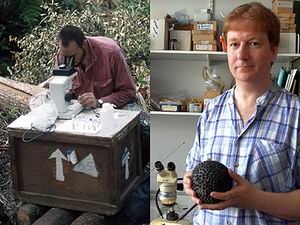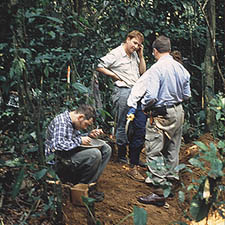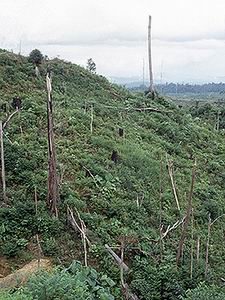Discovering and understanding
Termites
Soil quality
Termites dominate the insect world in some tropical soils. In the rainforests of West Africa, there can be 10,000 individuals under each square metre. In some soils they can make up 98 per cent of all insect biomass!
Like earthworms in Britain, termites help to maintain the quality and stability of tropical soils. But what happens to the termites when rainforests are cleared for wood or agriculture?

David Jones and Paul Eggleton has been collecting and studying these insects in rainforests across the globe to try and find out.
Learn more about:
 |
Historic collections
The Museum is well placed to do this research, as we have the largest collection of tropical termites in the world. |
Nutrient recyclers
Termites are busy workers. Their tunnelling and mound building activities, coupled with their amazing digestive systems, play a critical role in recycling nutrients from dead plants and releasing them back into the soil.

In Sumatra, a lot of the rainforest has been cleared for agriculture. Paul's Soil Team has been collecting soil samples from different deforested areas in order to identify and count the termite species left there.
Learn more about:
 |
Reference collections
How do scientists use our historic collections for reference? |
They have been using the Museum's comprehensive termite collection as a reference. It contains more than 80 per cent of all the known termite species. | |
Threat to agriculture
The researchers have found 34 species of termites in rainforests compared with only one in formerly forested areas that have been cleared for agriculture.

Since these insects are so important for breaking down plant material - and therefore providing nutrients that plants use to grow - a lack of them could have a detrimental effect on the soil quality and agriculture in these areas. In areas that depend on subsistence farming, this could have serious effects for the local population.
Paul's work will be important for understanding soil ecology in tropical environments. It might lead to ways of 'mending' infertile soil by re-introducing key termite species.